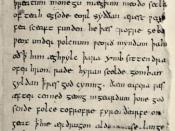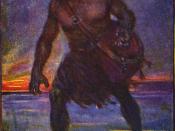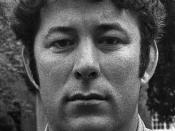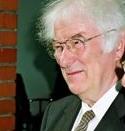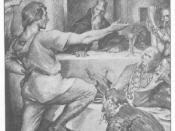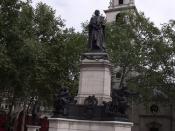ÃÂNow I mean to be a match for Grendel, settle the outcome in single combat./ my one request is that you wonÃÂt refuse me, who have come this far, the privilege of purifying Heorot, with my own men to help me, and nobody else.ÃÂ (Heaney 425-432).
In this passage, Beowulf is describing to Hrothgar why he has come to Denmark. Foster writes that a quest has five elements, a quester, a place to go, a stated reason to go there, challenges and trials, and a real reason to go there. Beowulf is the quester. The place to go is Denmark. The stated reason to go there is to slay Grendel. A challenge of his quest is GrendelÃÂs mom, and the real reason to go there is honor.
ÃÂThen a bench was cleared in the banquet hall so the Geats could have room to be together and the party sat, proud in their bearing, strong and stalwart.ÃÂ
(Heaney 491-494).
This portion of the poem shows how comfortable and appreciative the Danes feel toward the Geats for coming to slay Grendel. Foster comments, ÃÂWhenever people eat or drink together, itÃÂs communion.ÃÂ (Foster p.8). Communion is sharing a common experience with the other individuals dining with you. Therefore, in this section, the Geats and the Danes are sealing their alliance with one another.
ÃÂShoulder to shoulder, we struggled on for five nights, until the long flow and pitch of the waves, the perishing cold, night falling and winds from the north drove us apart.ÃÂ (Heaney 544-548).
The purpose of this section is BeowulfÃÂs boasting. Water usually signifies a life-changing experience, but for Beowulf it signifies strength and fearlessness. However, due to BrecaÃÂs demise, there are no witnesses to corroborate BeowulfÃÂs story, making it harder for the reader to believe BeowulfÃÂs account of the event. As far as the reader knows, the purpose of the story is to prove BeowulfÃÂs valor even though it may or may not be true.
ÃÂNow Holy God has, in His goodness, guided him here to the West-Danes, to defend us from Grendel.ÃÂ (Heaney 381-383).
In this passage, Beowulf has just arrived at Denmark. The Danes worship Beowulf for coming to protect them from the destructive monster. Beowulf equates with Jesus. In the Bible, God sends Jesus down to earth to protect the people from evil. Grendel represents evil. Therefore, this story is very similar to the Bible story.
ÃÂBeowulf got ready, donned his war-gear, indifferent to death; his mighty, hand-forged, fine-webbed mail would soon meet with the menace underwater.ÃÂ (Heaney 1442-1445).
This section is another example of a quest. Again, the quester is Beowulf. The place to go is GrendelÃÂs motherÃÂs lake. The stated reason to go there is to kill GrendelÃÂs mother. A trial he faces is the actual fight. Finally, what is the real reason he goes there? ÃÂThe real reason for a quest is always self-knowledge.ÃÂ (Foster p.3). Beowulf wishes to better his fighting skills and his reputation and this is the perfect way for him to do this. Therefore, the real reasons to go there are self-knowledge and honor.
ÃÂLight came from the east, bright guarantee of God, and the waves went quiet; I could see headlands and buffeted cliffs.ÃÂ (Heaney 569-572).
In this passage, Beowulf is explaining to the Danes the story of how he swam for 5 days straight. He is describing what happened once he saw land. He states that the water became still bringing him a sense of peace. Therefore, the water represents serenity and hope.
ÃÂHappiness came back, the hall was thronged, and a banquet set forth.ÃÂ(Heaney 1788-1790).
In this poem, a banquet is thrown in celebration. A banquet is thrown when Beowulf arrives in Denmark, again when Beowulf slays Grendel, and finally when he slaughters GrendelÃÂs mother. Foster stresses that eating together shows the characters sharing a common experience. In this case, it may be to give the Danes a sense of closure and peace.
ÃÂWell, friend Unferth, you have had your say about Breca and me./ The truth is this: when the going was heavy in those high waves, I was the strongest swimmer of all.ÃÂ (Heaney 530-534).
In this passage, Beowulf is correcting UnferthÃÂs statement about Beowulf failing the swimming contest. This portion of the poem is much like SophoclesÃÂ Oedipus. Unferth is questioning Beowulf just as Tiresias challenged Oedipus. When they are confronted, they begin to boast about themselves and their accomplishments.
Works CitedFoster, Thomas. How to Read Literature Like a Professor. New York City: HarperCollins Publishers Inc., 2003.
Beowulf. Trans. Seamus Heaney. Ed. C. L. Wrenn, W. F. Bolton. New York City: Norton, 2000.
